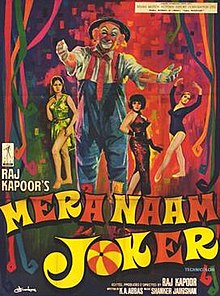
Back মেরা নাম জোকার Bengali/Bangla Mera Naam Joker German اسم من دلقک Persian મેરા નામ જોકર Gujarati मेरा नाम जोकर Hindi Mera Naam Joker ID 私はピエロ Japanese मेरा नाम जोकर Marathi मेरा नाम जोकर (सन् १९७०या संकिपा) NEW ਮੇਰਾ ਨਾਮ ਜੋਕਰ Punjabi
| Mera Naam Joker | |
|---|---|
 Theatrical release poster | |
| Directed by | Raj Kapoor |
| Screenplay by | K. A. Abbas |
| Story by | K. A. Abbas |
| Produced by | Raj Kapoor |
| Starring | |
| Cinematography | Radhu Karmakar |
| Edited by | Raj Kapoor |
| Music by | Shankar Jaikishan |
Production company | |
| Distributed by | R. K. Films |
Release date |
|
Running time | 248 minutes |
| Country | India |
| Language | Hindi |
| Box office | USSR: est. $22.13 million (₹168.1 million) |
Mera Naam Joker (transl. My Name Is Joker) is a 1970 Indian romantic drama film, directed, edited and produced by Raj Kapoor under his banner R. K. Films, and written by Khwaja Ahmad Abbas. The film stars Raj Kapoor as the eponymous character, with his son Rishi Kapoor making his screen debut playing his younger version, along with Simi Garewal, Kseniya Ryabinkina, Padmini, Manoj Kumar and Dharmendra in supporting roles. The plot focuses on a clown who must make his audience laugh at the cost of his sorrows; three women who shaped his life view his final performance.
The film is one of the lengthiest films of Indian cinema. Mera Naam Joker is the second and to date last Indian film to have two intervals, the first being Sangam (1964). After Sangam became a blockbuster, Mera Naam Joker was highly anticipated as it had been under production for six years and heavily publicized, loosely based on Kapoor's own life. The film was partly made with the participation of Soviet actors and was partly shot in Moscow.[1] The film's music, still very popular, was composed by Shankar Jaikishan, for which the duo got their ninth Filmfare award. In India, upon release the film was critical and commercial failure, putting Kapoor into a financial crisis, as the film was panned for its length and plot. The film has gained a cult status,[2] and is regarded as a classic today. Both audience's and critics' response has turned highly favourable with the passage of time.
An abridged version was released in the 1980s and had a highly successful run at the box office. Kapoor termed it his favourite film and described it as having much philosophical depth and meaning. The film is now regarded as one of Kapoor's finest works, with film experts labeling it as a "misunderstood masterpiece".[3] The film later on became a cult classic and is regarded as one of Raj Kapoor's best films and among the best Bollywood films of the 20th century. In the Soviet Union, the film also initially drew mixed reviews from critics, yet commercially became a blockbuster at the Soviet box office after it released there in 1972. Rather than being released as a single film, the film's three chapters were released separately as three parts in the Soviet Union. The three parts of the film collectively sold 73.1 million tickets at the Soviet box office.[4]
- ^ Salazkina, Masha (2010). "Soviet-Indian Coproductions: Alibaba as Political Allegory" (PDF). Cinema Journal. 49 (4): 71–89 [72–73]. doi:10.1353/cj.2010.0002.
- ^ "Cult Hindi films that flopped". The Times of India.
- ^ "Raj Kapoor's Russian co-star from Mera Naam Joker to mark his birth anniversary in Mumbai". Mumbai Mirror.
- ^ Cite error: The named reference
kinopoiskwas invoked but never defined (see the help page).